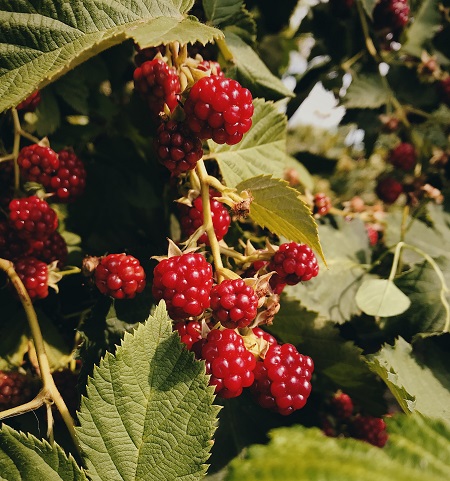
Raspberries have a long and rich history that dates back thousands of years. The earliest known record of raspberry cultivation dates to the 4th century BC in what is now Turkey. The ancient Greeks and Romans were known to cultivate raspberries and valued them for their medicinal properties. During the Middle Ages, raspberries were cultivated in monasteries and were used to create remedies for a variety of ailments.
In the 16th century, European explorers introduced raspberries to the Americas. By the 17th century, raspberries had become a popular fruit in England and were widely cultivated. In the 19th century, the first hybrid raspberry was created by crossing European and American varieties. The first commercial raspberry farms in the United States were established in the mid-1800s. In the 20th century, raspberry breeding programs were developed to create new and improved varieties of raspberries.
How to Grow Raspberries
Growing raspberries can be a rewarding experience, and here are some general steps to follow:
Variety Matters
Choose the right variety of raspberry plants for your area. Some raspberry varieties are better suited for certain climates and soil types, so it’s important to research and select the right type of raspberry plant for your location. See our list of good dry climate and good wet climate raspberries listed below.
Location Matters
Raspberries prefer full sun and well-drained soil. They should be planted in an area that is protected from strong winds, which can damage the plants.
Soil Matters
Raspberries prefer slightly acidic soil with a pH of around 6.0. Before planting, amend the soil with organic matter such as compost or well-rotted manure.
Planting
Plant the raspberry canes. Raspberry plants should be planted in early spring or late fall. Dig a hole deep enough to accommodate the roots, and space the plants 2-3 feet apart in rows that are 6-8 feet apart.
Watering
Raspberries need consistent moisture, especially during the growing season. Water deeply and regularly, being careful not to overwater, which can lead to root rot.
Mulching Helps
Mulch the plants. Apply a layer of mulch around the plants to help retain moisture and suppress weed growth.
Pruning
Prune the plants. Raspberries require regular pruning to promote healthy growth and fruit production. Prune in late winter or early spring, cutting back the canes that produced fruit the previous year.
Harvesting
Raspberries are typically ready for harvest in mid-summer. Pick the fruit when it is fully ripe and has a deep color, being careful not to damage the plant.
5 Good Raspberry Varieties for a Dry Climate
If you are living in a dry climate, it’s important to choose a raspberry variety that is drought-tolerant and can thrive with less water. Here are some raspberry varieties that are known to do well in dry climates:
Heritage
This is a popular variety of raspberry that is known for its sweet flavor and high yield. It is also drought-tolerant and can thrive in hot and dry conditions.
Latham
This is another popular variety that is well-suited for dry climates. It produces large, firm berries and is known for its disease resistance.
Canby
This variety is known for its large, bright red berries and its ability to tolerate drought and heat.
Boyne
This is a hardy and disease-resistant variety that produces large, juicy berries. It can also tolerate dry conditions and extreme temperatures.
Tulameen
This is a high-yielding variety that produces large, flavorful berries. It is also tolerant of drought and heat.
Remember, even drought-tolerant raspberry varieties will require some watering during dry spells. Be sure to water deeply and infrequently to encourage deep root growth and help the plants survive periods of drought/
5 Good Raspberry Varieties for a Wet Climate
If you live in a wet climate, it’s important to choose a raspberry variety that is resistant to diseases that can thrive in damp conditions. Here are some raspberry varieties that are known to do well in wet climates:
Caroline
This variety is known for its high yield and its ability to thrive in wet conditions. It produces large, flavorful berries and is resistant to diseases like Phytophthora root rot.
Polana
This is a hardy and disease-resistant variety that produces large, firm berries. It can tolerate wet conditions and is also resistant to diseases like verticillium wilt and root rot.
Fallgold
This is a yellow raspberry variety that is known for its sweet flavor and its ability to thrive in wet conditions. It produces fruit in late summer to early fall.
Nova
This is a high-yielding variety that produces large, sweet berries. It is also disease-resistant and can tolerate wet conditions.
Anne
This is a yellow raspberry variety that is known for its juicy and sweet berries. It is also disease-resistant and can thrive in wet conditions.
Remember, even disease-resistant raspberry varieties can still be susceptible to diseases in extremely wet conditions. To reduce the risk of disease, be sure to provide good air circulation around the plants and avoid overhead watering, which can promote the growth of fungal diseases.
10 Fun Facts About Raspberries
Raspberries are a member of the rose family and are related to other fruits like strawberries, blackberries, and peaches.
The word “raspberry” comes from the Old French word “rasper,” which means “to scratch.” This refers to the thorny canes of the raspberry plant.
Raspberries were once used as a natural dye for clothing and textiles. The fruit’s red color was extracted and used to dye fabrics.
Raspberries are not technically berries, but rather an aggregate fruit made up of many individual drupelets (small fruits with a single seed inside).
Raspberries are very high in antioxidants, which are compounds that can protect against cell damage and may help reduce the risk of chronic diseases.
The United States is the world’s largest producer of raspberries, followed by Poland and Serbia.
Raspberries are a popular fruit for baking and are often used in desserts like pies, tarts, and cakes.
There are over 200 different species of raspberries, each with their own unique characteristics and flavors.
Raspberries were once considered a luxury food and were reserved for the wealthy.
In some cultures, raspberries are believed to have medicinal properties and are used to treat a variety of ailments, including digestive issues, and respiratory problems.
Related Articles & Free Email Newsletter Sign Up
How To Test Garden Soil for pH and Correct It
How Recycling Eggshells Can Help Your Garden




Comment here